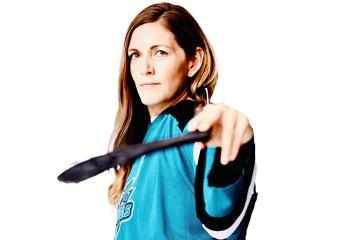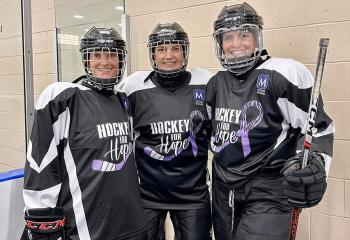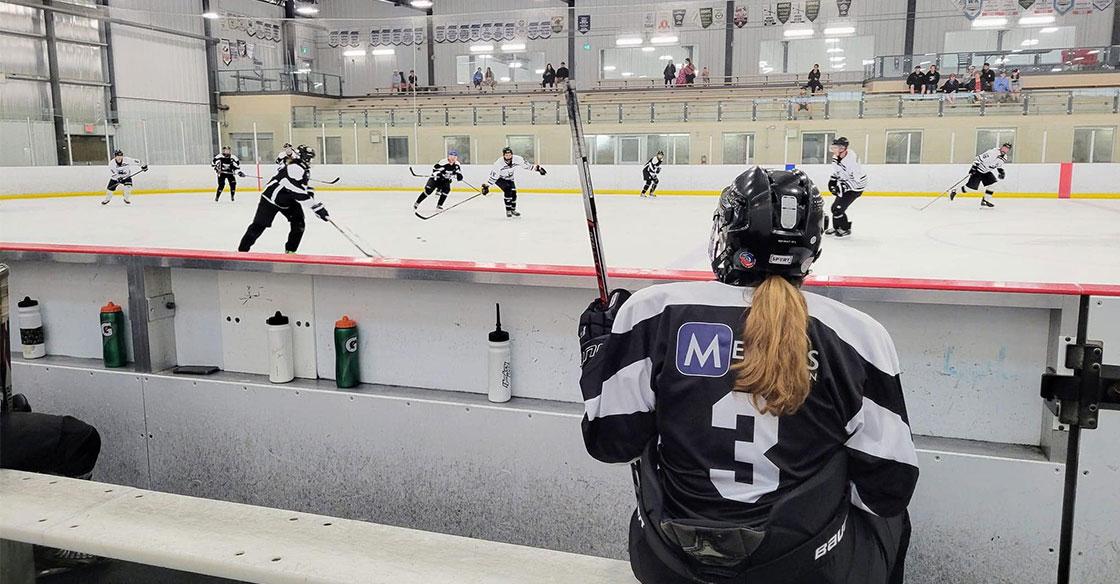
Hope Singer has never met Shay Needham, but she has directly benefited from a grant program she funds through an annual charity hockey tournament in support of mental health services for cancer patients.
Shay, a 10-year cancer survivor herself, established the grant program through the QEII Foundation to help cover the costs of mental health help for cancer patients receiving care at the QEII Health Sciences Centre. Although free mental health care is available to all cancer patients through the psychosocial oncology service in the NS Health cancer care program, care providers also have the opportunity to apply for grants of up to $1,000 for patients they feel would benefit from financial assistance – helping them access additional supports in the community that support their mental health, including private counselling.
Shay’s life changed forever when she was diagnosed with lung neuroendocrine cancer in 2015 at the age of 42. She hadn’t been feeling well for several years, but no one seemed to know why. Once finally diagnosed, she underwent major surgery to remove a golf-ball sized tumour from her lung and upon returning home, suffered profound personal and professional losses that added significantly to the cancer-related stress she was experiencing.
Devastated and struggling with the social and emotional impacts of her cancer experience, Shay explains that the disease ultimately resulted in new anxiety and mental health challenges that Shay hadn’t experienced before.
“Everything I had fought for blew up in my face,’’ she recalls. “I didn’t want to get out of bed and I was left wondering what I was doing all of this for.’’
Shay mustered-up the courage to ask for help and started seeing a therapist through her health insurance which she says was exactly what she needed to help her work through the trauma she had experienced as well as make a plan for moving forward.
But not everyone has that same coverage or access – inspiring Shay to help enhance care for future patients and survivors.
An avid sports and health enthusiast, Shay saw an opportunity to combine her love of hockey with a fundraiser to help other cancer patients receive the mental health support they need – whether it’s helping to cover the cost of private counselling or treatments and therapies for their mental wellbeing. In 2023, she created Hockey for Hope; a three-day co-ed inclusive hockey tournament that has raised $72,000 and allowed for a total of 76 grants to QEII cancer patients since its inception.
Although it has been highly successful, interestingly enough, Shay says the annual charity tournament isn’t really about hockey.
“Hockey is the avenue to make a difference. It’s really about helping cancer patients and this is just the vehicle to do it,’’ she says of the co-ed inclusive tournament being held September 5-7 at the Greenfoot Energy Centre in Bedford.
A total of 10 teams participated in the first Hockey for Hope which raised $33,000. Last year’s event grew to 16 teams and raised $39,000 and although registration doesn’t open until later this month, Shay is more determined than ever to make 2025 the most successful year yet.
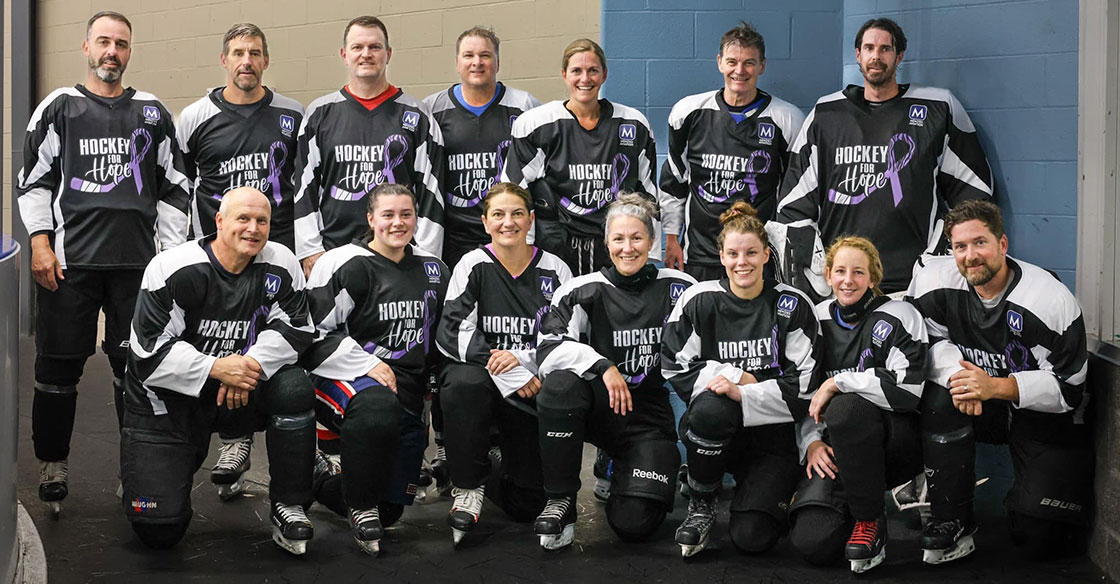
AN URGENT NEED
“This year we’re hoping to get 24 teams and our goal is to hit at least $40,000 raised – it’s not just about taking Hockey for Hope to the next level, it’s meeting an urgent need for cancer patients in our community,” says Shay.
As she explains, 100 per cent of the funds raised through Hockey for Hope support these vital mental health grants for cancer patients; support that’s more crucial than ever. As of April 2025, grant applications are temporarily closed until more funds are available.
“We really need the community to help us, as we want to ensure that these grants are always available to those who have the courage to ask for help,’’ Shay says with a sense of urgency.
The grassroots fundraiser depends heavily on the support of the local hockey community, but what Shay says she desperately needs is corporate sponsorship in order to keep the fund going and growing.
“I’ve spoken to my oncologist and there is a huge need. These grants can help address and alleviate some of that – ensuring that this support is available for patients,’’ she goes on to say.
Hockey for Hope is Shay’s way of advocating for others and a means of showing her gratitude for the good health she currently enjoys, nearly 10 years after her initial diagnosis.
“For me, part of the reason I do it is because I can. I’m so grateful for my health and that I can actually do something to help. People should be really grateful for their health. It’s such a gift.’’
DONATE TO HOCKEY FOR HOPE NOW>>
SUPPORTING PATIENTS LIKE HOPE
Hope Singer received her cancer diagnosis on what was supposed to be one of the happiest days of her young life – high school graduation. The now 19-year-old’s leukemia has been in remission for the past year-and-a-half, but she continues to endure weekly chemotherapy treatments in hopes of avoiding a recurrence.
Her life is slowly returning to normal, but she was extremely sick at the beginning of her harsh treatments and spent a lot of time in hospital. While her friends and classmates were moving on with their lives and looking to the future with excitement and optimism, Hope felt left behind and silently fearing the worst.
“I had a hard time seeing the light at the end of the tunnel at times,’’ she admits. “When I was sick, I would only focus on that and I felt like I was never going to get over it and feel better and normal again. It took a big toll on my mental health.’’
Although hesitant to ask for help for a long time, she eventually started virtual therapy with a therapist from the psychosocial oncology team who also applied for a mental health grant on her behalf. Hope chose to have massage therapy as a way of alleviating the enormous amount of pent-up stress in her body and muscle pain caused by her treatments which she says has changed her life.
She was fortunate to find a massage therapist close to her remote rural Nova Scotia home and was able to have six treatments through the grant. She continues to go monthly when feeling well enough.
Between the mental health support and massage therapy, Hope is now in a much better place in terms of her mental health and says she’s “finally able to realize just how lucky” she is to have survived cancer – something she always tries to keep in mind.
She’s extremely grateful for the organizers, players and donors behind Hockey for Hope for helping fund her treatments which have greatly improved both her mental and physical health.
“It not only helps you with your physical health by going to massage therapy, I think it opens your eyes to your own body and how you can better treat it and it helps you get through your treatments better,’’ says Hope, pictured below enjoying her favourite pastime.
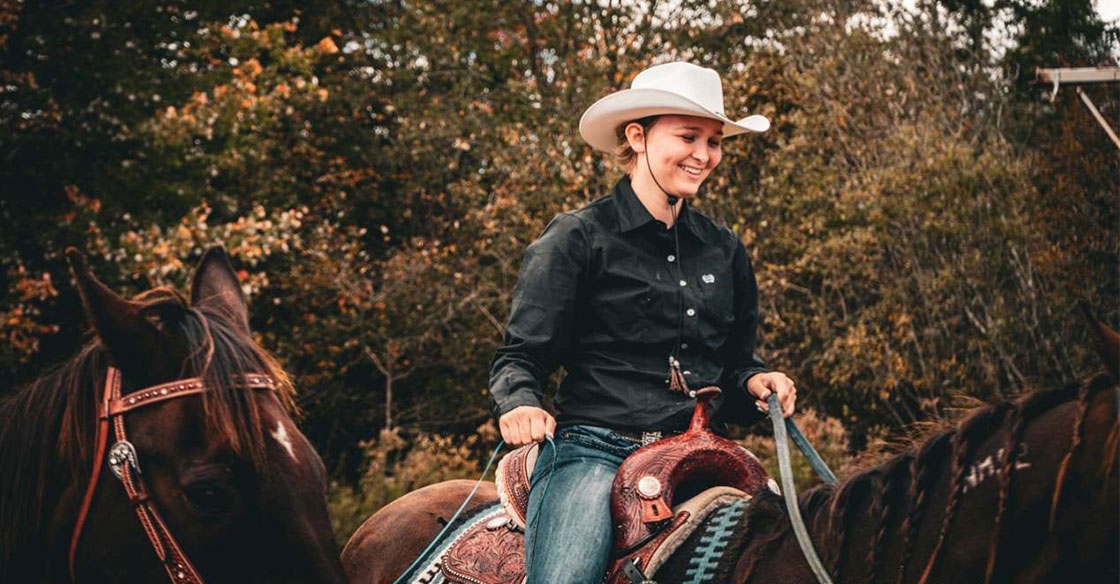
CANCER CARE TEAMS SEEING IMPACT FIRSTHAND
As a healthcare social worker with the QEII’s psychosocial oncology team at the Nova Scotia Cancer Centre, Alyson Currie and the multi-disciplinary team provide front-line mental health care that’s free to all cancer patients at any point in their journey, from diagnosis through survivorship and beyond. However, she has experienced firsthand the direct impact of these mental health grants, which she describes as a wonderful gift, particularly for those who would not otherwise be able to afford it.
She has personally applied for at least 10 grants on behalf of her patients for a variety of highly-personalized support services including mental health apps, massage therapy, therapeutic touch, couple’s counselling, acupuncture, as well as support services for younger children who have a parent with cancer.
“Even if people have some private coverage, it’s not unlimited and the cost of such services is continuing to increase,’’ she explains. “I just see so many benefits to these grants and their flexibility, as everyone’s mental health needs are different. For so many, finances are a barrier.’’
She says prioritizing mental health during a cancer journey is equally important as physical health. In fact, she explains that cancer patients often have better outcomes when their mind, body and spirit are treated as a whole.
“We know there’s a high level of cancer-related psychological distress and it’s normal for people to have anxiety, depression and exacerbation of any other mental health issues they’ve experienced before cancer,” says Alyson. “It’s so important to assess that and to provide comprehensive mental health care.”
Patient feedback has been incredibly positive from those who have received the grants which Alyson says are easy to apply for and have a really quick turn-around time once approved. She always makes a point of sharing a bit about Hockey for Hope and Shay’s story so recipients know exactly where the funding is coming from.
She feels the coming together of the community to fund programs like this helps cancer patients feel that someone cares and gives them hope, not only throughout their cancer journey, but into survivorship.
She believes the Hockey for Hope funded grant program has the power to change people’s lives by reducing the barrier to bring equitable access to the mental health support services many people take for granted.
“It is a good feeling knowing that I can secure additional supports for someone outside of their clinical therapy sessions with me – setting them up with that extra help to implement and maintain the coping strategies that we develop together. This helps them to remain psychologically well, or helps them become more psychologically well despite their cancer as it better equips them to cope with things.”
To learn more or play in this year’s Hockey for Hope tournament, click here. To volunteer, get involved as a sponsor or donate auction items, email hockeyforhopetourney@gmail.com. To donate now and help ensure these mental health grants are available for cancer patients, visit: QE2Foundation.ca/HockeyForHope.
~*~*~
If you have a diagnosis of cancer and would like to see someone for mental health or other psychosocial care, you may be referred to psychosocial oncology by one of your healthcare providers, or you can self refer by calling the self referral line at 902 240 8129.
